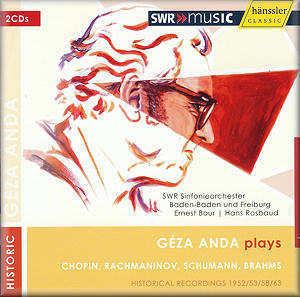 |
 |
|


alternatively
CD: AmazonUK
AmazonUS
Download: Classicsonline
|
Géza Anda - Concertos
CD 1
Fryderyk CHOPIN (1810-1849)
Piano concerto no.1 in E minor, op.11 (1830) [38:40]
Sergei RACHMANINOV (1873-1943)
Piano Concerto No.2 in C minor, op.18 (1901) [32:15]
CD 2
Robert SCHUMANN (1810-1856)
Piano Concerto in A minor, Op. 54 (1845) [30:55]
Johannes BRAHMS (1833-1897)
Piano Concerto No 2 in B flat Op 83 (1878-81) [47:15]
 Géza Anda (piano)
Géza Anda (piano)
SWR Symphony Orchestra Baden-Baden und Freiburg/Hans
Rosbaud (Rachmaninov, Brahms) Ernest Bour (Chopin, Schumann)
rec. 18 March 1952 (Chopin), 3 May 1953 (Rachmaninoff) 12 March 1963
(Schumann), 8 April 1958 (Brahms); Hans Rosbaud
Studio, Baden-Baden
 HÄNSSLER
CD94.208 [71:08 + 78:25] HÄNSSLER
CD94.208 [71:08 + 78:25] 
|
|
|
Radio archives are disgorging their treasures almost weekly and
German archives are in the vanguard. Sifting them one doesn’t
often encounter fool’s gold – and nor does one here in this slimline
2 CD set devoted to Anda and his collaboration with Ernest Bour
and Hans Rosbaud in Baden-Baden und Freiburg. The broadcasts were
taped in the near-decade between 1952 and 1963.
The earliest of the quartet of concertos is the Chopin, with Bour.
Characterful and individualist – there are some personalised touches
in the passagework for instance – we find that Anda and Bour take
pains to ensure that the polyphonic lines are brought out, and
that the limpidity of the slow movement is not compromised by
slack rhythmic underpin. Similarly there is verve and buoyancy
in the finale which goes particularly well. The companion work
in the first disc is Rachmaninoff’s C minor, taped the following
year with Rosbaud. This conductor, now achieving a measure of
retrospective acclaim that he never quite seemed to garner in
his lifetime, was invariably a valued accompanist. His performances
with Dennis Brain in Mozart, for instance, seem to me better than
Karajan’s. Here we have a Birth of the Cool approach to the romantic
repertoire from both soloist and conductor. The piano is just
too forward for good balance and there are quite a few finger
slips in the first movement, as well as a few uneasy moments of
ensemble. The dominant impression however is one of objectified
classicism, especially in the slow movement with its lightening
of the string textures. The finale sees strong retardation of
the rhythmic impetus of the music making, a promotion of treble
based sonorities, and a schematic, ponderous approach that loses
its way, and its spine, several times. This is, according to the
notes, apparently a ‘freeing of the concerto from its ballast
of effusive Romantic sounds.’ In that case give me ballast, and
give me effusion. It’s telling that Anda dropped the concerto
in the 1960s – his earlier commercial recording is out on Testament.
The Schumann concerto comes from the same year in which he set
down his commercial recording with Kubelik. Bour is faster in
the first movement than Kubelik, and somewhat more emphatic as
well. There is a chamber delicacy to many of the exchanges, and
a sure realisation of the Bachian elements of some of the passages.
Note too how Anda varies his tone, its weight, and the shape of
phrasing in his dialogues with the wind principals; the sensitively
shaped dynamics in the slow movement too are a masterly touch.
The last work is Brahms’s mighty B flat major concerto, taped
with Rosbaud in 1958. Things start not unlike to Gilels-Jochum
but thereafter diverge. Sonorities nevertheless are commanding,
control is paramount and assured. Anda’s tone never coarsens or
hardens, and tension is maintained throughout, rubati being integrated
and nuanced, never manicured. No extraneous points are being made,
unlike in the Rachmaninoff. There’s chamber felicity in the slow
movement, not unlike the Schumann in its effectiveness. The finale
is playful and maturely musical. Splendid, all round, in fact.
Three out of four hits here, in radio broadcasts of good sound.
Anda mavens can happily add this as an ancillary collection.
Jonathan Woolf
|
|
|












